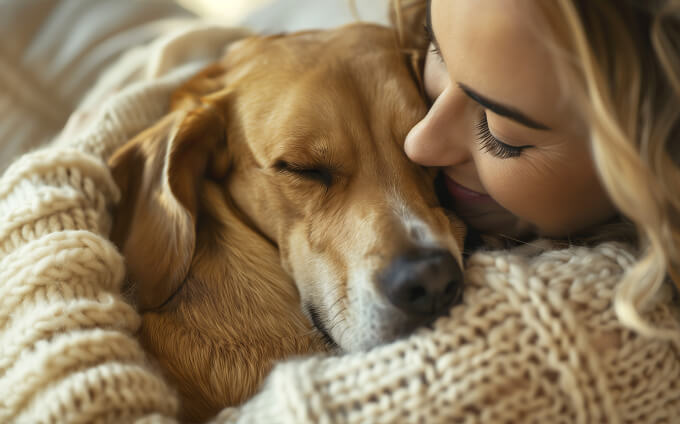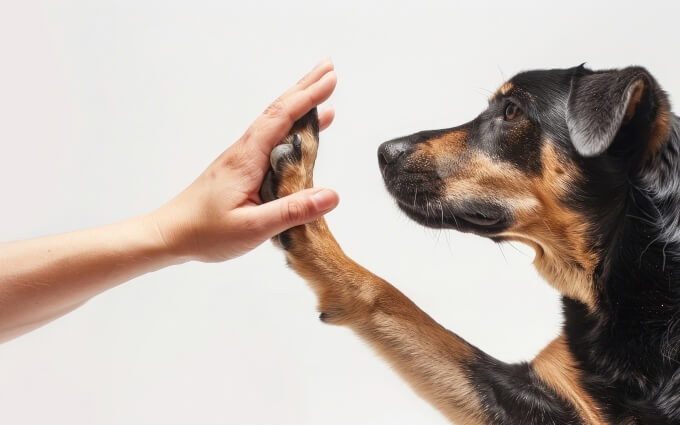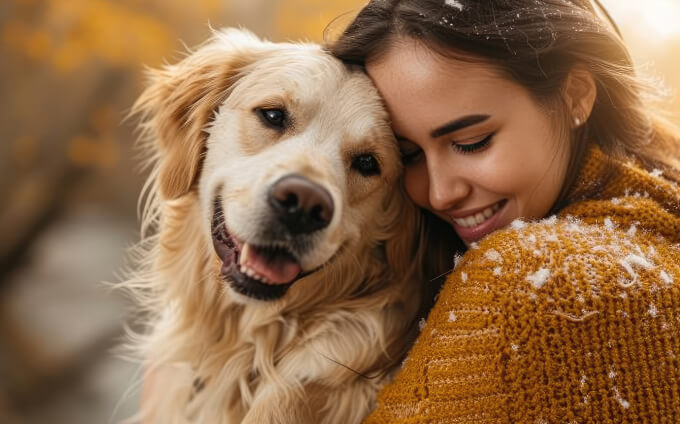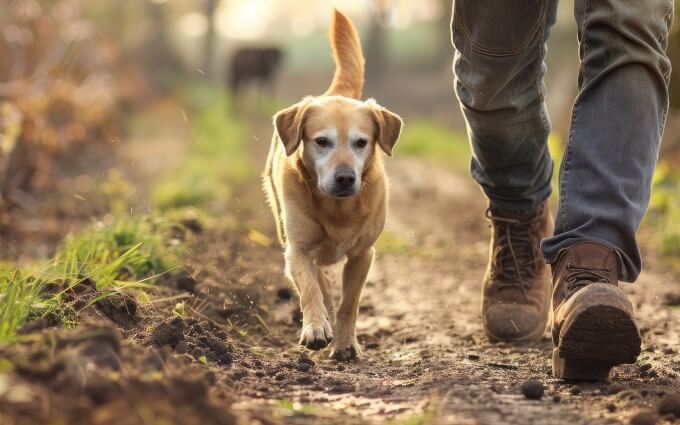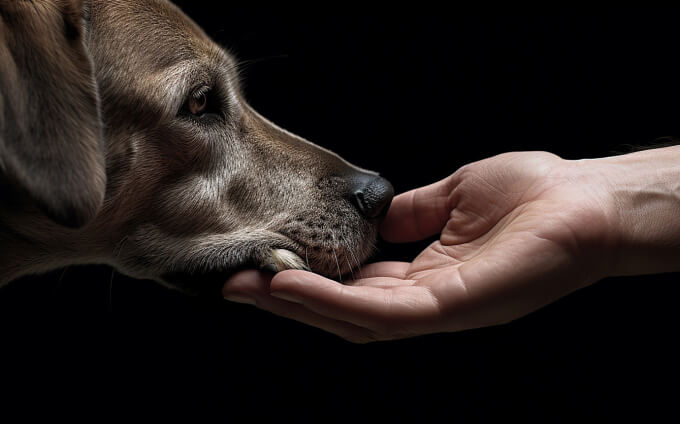- Home
- Dog Behavior
- How Much Does a Dog Sleep? Understanding Your Pup's Snooze Habits
How Much Does a Dog Sleep? Understanding Your Pup's Snooze Habits
Learn about the varying sleep needs of dogs based on age, breed, and other factors. Find out if your dog is getting enough rest and how to help them sleep better.

- 36

The Snooze Stats: How Much Sleep Does Your Dog Need?
You've probably noticed that your dog can spend a significant amount of time napping throughout the day. But just how much sleep is normal for our furry friends? The amount of sleep a dog needs varies based on factors such as age, breed, and activity level.
Puppies: Little Bundles of Sleep
Puppies are the champions of sleep, requiring anywhere from 18 to 20 hours of snooze time per day. This extensive rest is crucial for their development, helping their central nervous system, immune system, and muscles grow properly.
Adult Dogs: The Middle Ground
Adult dogs typically need between 8 and 14 hours of sleep each day. The exact amount can depend on their breed and daily activity. For instance, larger breeds like Great Danes and Mastiffs may sleep up to 18 hours, while smaller or more active breeds might be on the lower end of the spectrum.
Senior Dogs: More Rest for the Golden Years
As dogs age, they tend to sleep more. Senior dogs can snooze for up to 20 hours a day. Their increased need for sleep helps them recover from daily activities and manage any health issues they might be facing.
Factors Affecting Your Dog's Sleep
Several factors can influence how much your dog sleeps, including their environment, health, and daily routine.
Exercise
Active dogs who get plenty of exercise tend to sleep better and longer. If your dog has been more active than usual, such as starting a new training regimen or attending doggy daycare, they might need more sleep to recover.
Environment
A noisy or busy household can disrupt your dog's sleep. Creating a quiet, comfortable space for them to rest can help ensure they get the sleep they need.
Health
Health issues like arthritis, diabetes, or respiratory problems can affect your dog's sleep patterns. If you notice significant changes in their sleep habits, a visit to the vet is a good idea to rule out any underlying conditions.
Is Your Dog Getting Enough Sleep?
Monitoring your dog's behavior can give you clues about whether they are getting sufficient rest. Dogs that are well-rested are typically more relaxed and happy. Signs of sleep deprivation in dogs can include irritability, heightened stress responses, and changes in appetite.
- If your dog is unusually restless at night or seems excessively sleepy during the day, it may indicate a problem.
- Keep an eye on their overall behavior and consult your vet if you have concerns.
Tips to Help Your Dog Sleep Better
Ensuring your dog gets enough sleep is essential for their health and well-being. Here are some tips to help your dog rest better:
- Create a comfortable sleeping area:A cozy bed in a quiet, dark place can help your dog feel safe and relaxed.
- Maintain a consistent routine:Dogs thrive on routine, so try to keep their feeding, walking, and bedtime schedules consistent.
- Exercise regularly:Regular physical activity can help tire your dog out and make it easier for them to sleep at night.
- Address health issues:If your dog has any health problems, work with your vet to manage them effectively.
Frequently Asked Questions about Dog Sleep
How many hours a day does a dog usually sleep?
Most adult dogs sleep between 12 and 14 hours a day, while puppies and older dogs may sleep even longer.
Do puppies sleep more than adult dogs?
Yes, puppies often sleep up to 18–20 hours a day to support their rapid growth and development.
Why does my dog sleep so much?
Dogs sleep a lot to restore energy, and their sleep patterns are different from humans with more frequent naps.
Is it normal for senior dogs to sleep more?
Yes, older dogs tend to sleep more because of lower energy levels and possible health conditions.
When should I worry about my dog's sleeping habits?
If your dog suddenly changes its sleep patterns or seems overly lethargic, it's best to consult a veterinarian.
Conclusion: Sweet Dreams for Your Pooch
Understanding your dog's sleep needs is key to ensuring they live a healthy and happy life. By paying attention to their sleep patterns and making any necessary adjustments, you can help your furry friend get the rest they need. Whether it's creating a more comfortable sleeping environment or addressing health concerns, a little effort goes a long way in making sure your dog enjoys their snooze time to the fullest.
- 36
 Michelle Torring
Michelle Torring
Michelle is a passionate dog owner who spends most of her free time with her 6-year-old golden retriever, Bella. The two are a familiar sight in the neighborhood, often seen on long walks in the park or at the beach. Michelle loves training Bella in agility and they often compete in local competitions where Bella impresses with her speed and agility. Every Sunday, Michelle organizes playdates for dogs in the neighborhood where both dogs and owners can socialize and learn from each other. To Michelle, Bella is not just a dog, but a beloved family member and faithful companion.
-
Dog Behavior
 Does My Dog Know I Care About It?
Does My Dog Know I Care About It?Discover the ways your dog shows it knows you care and how you can reinforce that loving bond through simple actions and daily interactions.
 Cassandra DalgaardAug 05, 202444
Cassandra DalgaardAug 05, 202444 -
Food & Nutrition
 The Best Foods to Boost Your Dog's Immune System
The Best Foods to Boost Your Dog's Immune SystemTo keep your dog healthy and resilient, fueling their immune system with the right foods is key. In this post, we'll cover the top nutrient-packed foods that can give your dog's immune system the support it needs, helping them fend off illness and stay energetic.
 Marcin SolgaardOct 04, 20249
Marcin SolgaardOct 04, 20249 -
Tips & Tricks
 How to Train Your Dog to Give Paw
How to Train Your Dog to Give PawTeaching your dog to give paw is a fun and rewarding experience that strengthens your bond. This guide walks you through the process with tips, tricks, and plenty of paw-sitive reinforcement.
 Marcin SolgaardApr 11, 202441
Marcin SolgaardApr 11, 202441 -
Dog health
 Which Emotions Do Dogs Actually Experience? Understanding Your Dog's Emotions
Which Emotions Do Dogs Actually Experience? Understanding Your Dog's EmotionsDogs experience a variety of basic emotions similar to those of a young child. Learn about the emotions your dog truly feels, how they express them, and what it means for your relationship.
 Cassandra DalgaardJul 30, 202478
Cassandra DalgaardJul 30, 202478 -
Tips & Tricks
 How to Train Your Dog to Walk Off-Leash
How to Train Your Dog to Walk Off-LeashThis guide will walk you through everything you need to know, from essential commands to mastering off-leash walks even in distracting environments
 Marcin SolgaardJul 02, 202451
Marcin SolgaardJul 02, 202451 -
Dog Behavior
 How to Help a Shy or Nervous Dog Build Confidence
How to Help a Shy or Nervous Dog Build ConfidenceHelping a shy or nervous dog build confidence takes time, patience, and the right techniques. With a structured approach, you can gradually encourage your dog to feel safe, secure, and ready to take on new challenges.
 Michelle TorringSep 22, 202415
Michelle TorringSep 22, 202415 -
Dog Behavior
 Why Your Dog Ignores You and How to Change It
Why Your Dog Ignores You and How to Change ItIs your dog ignoring you? Explore the reasons behind this behavior and actionable steps to bring back the focus, from training techniques to environmental adjustments.
 Marcin SolgaardJul 16, 202439
Marcin SolgaardJul 16, 202439 -
Food & Nutrition
 How to Choose the Right Diet for Your Allergic Dog
How to Choose the Right Diet for Your Allergic DogFind out how to select the perfect diet for your dog with allergies. Learn about elimination diets, hypoallergenic foods, and the best ingredients to keep your furry friend healthy and happy.
 Marcin SolgaardJun 09, 202427
Marcin SolgaardJun 09, 202427 -
Tips & Tricks
 Are You Ready for Life with a Dog? Everything You Need to Know
Are You Ready for Life with a Dog? Everything You Need to KnowThis guide helps you determine if you're ready for a dog by exploring the responsibilities, financial requirements, and lifestyle changes necessary for successful dog ownership.
 Marcin SolgaardJul 31, 202433
Marcin SolgaardJul 31, 202433 -
Dog Behavior
 Why Does My Dog Put Its Head on Me? Understanding the Behavior
Why Does My Dog Put Its Head on Me? Understanding the BehaviorEver wondered why your dog puts its head on you? This guide dives into the reasons behind this endearing behavior, from seeking comfort to showing love.
 Michelle TorringAug 03, 202428
Michelle TorringAug 03, 202428

